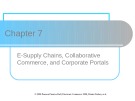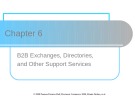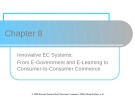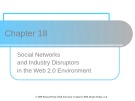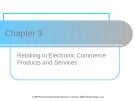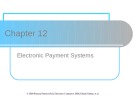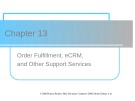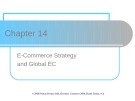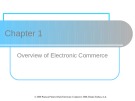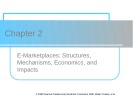
Lecture Electronic commerce
-
Lecture Electronic commerce - Chapter 7: E-Supply Chains, Collaborative Commerce, and Corporate Portals learning objectives: Define the e-supply chain and describe its characteristics and components. List supply chain problems and their causes. List solutions to supply chain problems provided by EC. Describe RFID supply chain applications. Define c-commerce and list the major types.
 50p
50p  caphesuadathemtac
caphesuadathemtac
 09-11-2021
09-11-2021
 19
19
 5
5
 Download
Download
-
Lecture Electronic commerce - Chapter 4: Consumer behavior, market research, and advertisement learning objectives: Describe the factors that influence consumer behavior online. Understand the decision-making process of consumer purchasing online. Describe how companies are building one-to-one relationships with customers. Explain how personalization is accomplished online. Discuss the issues of e-loyalty and e-trust in EC. Describe consumer market research in EC.
 55p
55p  caphesuadathemtac
caphesuadathemtac
 09-11-2021
09-11-2021
 30
30
 4
4
 Download
Download
-
Lecture Electronic commerce - Chapter 5: B2B E-Commerce: Selling and Buying in Private E-Markets learning objectives: Describe the B2B field. Describe the major types of B2B models. Discuss the characteristics of the sell-side marketplace, including auctions. Describe the sell-side intermediary models. Describe the characteristics of the buy-side marketplace and e-procurement. Explain how reverse auctions work in B2B.
 50p
50p  caphesuadathemtac
caphesuadathemtac
 09-11-2021
09-11-2021
 26
26
 4
4
 Download
Download
-
Lecture Electronic commerce - Chapter 6: B2B Exchanges, Directories and Other Support Services learning objectives: Define exchanges and describe their major types. Describe the various ownership and revenue models of exchanges. Describe B2B portals. Describe third-party exchanges. Distinguish between purchasing (procurement) and selling consortia.
 43p
43p  caphesuadathemtac
caphesuadathemtac
 09-11-2021
09-11-2021
 14
14
 4
4
 Download
Download
-
Lecture Electronic commerce - Chapter 8: Innovative EC Systems: From E-Government and E-Learning to Consumer-to-Consumer Commerce learning objectives: Describe various e-government initiatives. Describe e-learning, virtual universities, and e-training. Describe online publishing and e-books. Discuss wikis and blogging. Describe knowledge management and dissemination as an e-business. Describe C2C activities. Describe peer-to-peer networks and applications.
 47p
47p  caphesuadathemtac
caphesuadathemtac
 09-11-2021
09-11-2021
 21
21
 4
4
 Download
Download
-
Lecture Electronic commerce - Chapter 10: Dynamic Trading: E-Auctions, Bartering and Negotiations learning objectives: Define the various types of e-auctions and list their characteristics. Describe forward and reverse auctions. Describe the benefits and limitations of e-auctions. Describe some unique e-auction models. Describe the various services that support e-auctions.
 41p
41p  caphesuadathemtac
caphesuadathemtac
 09-11-2021
09-11-2021
 17
17
 4
4
 Download
Download
-
Lecture Electronic commerce - Chapter 15: Economics and Justification of Electronic Commerce learning objectives: Describe the need for justifying EC investments, how it is done, and how metrics are used to determine justification. Understand the difficulties in measuring and justifying EC investments. Recognize the difficulties in establishing intangible metrics and describe how to overcome them. List and briefly describe traditional and advanced methods of justifying IT investments.
 50p
50p  caphesuadathemtac
caphesuadathemtac
 09-11-2021
09-11-2021
 17
17
 4
4
 Download
Download
-
Lecture Electronic commerce - Chapter 17: Legal, Ethical, and Compliance Issues in EC learning objectives: Understand the foundations for legal and ethical issues in EC. Describe civil, intellectual property, and common law. Understand legal and ethical challenges and how to contain them. Explain privacy, free speech, and defamation and their challenges. Discuss the challenges caused by spam, splogs, and pop-ups. Describe types of fraud on the Internet and how to protect against it.
 42p
42p  caphesuadathemtac
caphesuadathemtac
 09-11-2021
09-11-2021
 18
18
 4
4
 Download
Download
-
Lecture Electronic commerce - Chapter 18: Social Networks and Industry Disruptors in the Web 2.0 Environment learning objectives: Understand the Web 2.0 revolution, social and business networks and industry and market disruptors. Describe Google and the search engine industry, the impact on advertisement, and the industry competition. Understand the concept, structure, types and issues of virtual communities. Understand the social and business networks and describe MySpace, Flicker, Facebook, CyWorld, and other amazing sites
 55p
55p  caphesuadathemtac
caphesuadathemtac
 09-11-2021
09-11-2021
 36
36
 4
4
 Download
Download
-
Lecture Electronic commerce - Chapter 3: Retailing in Electronic Commerce: Products and Services learning objectives: Describe electronic retailing (e-tailing) and its characteristics. Define and describe the primary e-tailing business models. Describe how online travel and tourism services operate and their impact on the industry. Discuss the online employment market, including its participants, benefits, and limitations. Describe online real estate services. Discuss online stock-trading services.
 49p
49p  caphesuadathemtac
caphesuadathemtac
 09-11-2021
09-11-2021
 15
15
 3
3
 Download
Download
-
Lecture Electronic commerce - Chapter 9: Mobile Computing and Commerce and Pervasive learning objectives: Describe the mobile computing environment that supports m-commerce (devices, software, services). Describe the four major types of wireless telecommunications networks. Define mobile commerce and understand its relationship to e-commerce. Discuss the value-added attributes, benefits, and fundamental drivers of m-commerce. Discuss m-commerce applications in finance, shopping, advertising, and provision of content. Describe the application of m-commerce within organizations.
 53p
53p  caphesuadathemtac
caphesuadathemtac
 09-11-2021
09-11-2021
 23
23
 3
3
 Download
Download
-
Lecture Electronic commerce - Chapter 11: E-Commerce Security learning objectives: Explain EC-related crimes and why they cannot be stopped. Describe an EC security strategy and why a life cycle approach is needed. Describe the information assurance security principles. Describe EC security issues from the perspective of customers and e-businesses.
 51p
51p  caphesuadathemtac
caphesuadathemtac
 09-11-2021
09-11-2021
 18
18
 3
3
 Download
Download
-
Lecture Electronic commerce - Chapter 12: Electronic Payment Systems learning objectives: Understand the shifts that are occurring with regard to noncash and online payments. Discuss the players and processes involved in using credit cards online. Discuss the different categories and potential uses of smart cards. Discuss various online alternatives to credit card payments and identify under what circumstances they are best used.
 40p
40p  caphesuadathemtac
caphesuadathemtac
 09-11-2021
09-11-2021
 17
17
 3
3
 Download
Download
-
Lecture Electronic commerce - Chapter 13: Order Fulfillment, eCRM, and Other Support Services learning objectives: Describe the role of support services in EC. Define EC order fulfillment and describe the EC order fulfillment process. Describe the major problems of EC order fulfillment. Describe various solutions to EC order fulfillment problems. Describe CRM, its methods, and its relationship with EC. Describe eCRM implementation and tools. Describe other EC support services. Discuss the drivers of outsourcing support services.
 52p
52p  caphesuadathemtac
caphesuadathemtac
 09-11-2021
09-11-2021
 23
23
 3
3
 Download
Download
-
Lecture Electronic commerce - Chapter 14: E-Commerce Strategy and Global EC learning objectives: Describe the strategic planning process. Describe the purpose and content of a business plan. Understand how e-commerce impacts the strategic planning process. Understand how to formulate, justify, and prioritize EC applications.
 45p
45p  caphesuadathemtac
caphesuadathemtac
 09-11-2021
09-11-2021
 15
15
 3
3
 Download
Download
-
Lecture Electronic commerce - Chapter 16: Launching a Successful Online Business and EC Projects learning objectives: Understand the fundamental requirements for initiating an online business. Describe the process of initiating and funding a start-up e-business or large e-project. Understand the process of adding EC initiatives to an existing business. Describe the issues and methods of transforming an organization into an e-business. Describe the process of acquiring Web sites and evaluating building versus hosting options.
 45p
45p  caphesuadathemtac
caphesuadathemtac
 09-11-2021
09-11-2021
 16
16
 3
3
 Download
Download
-
Lecture Electronic commerce - Chapter 19: Building E-Commerce Applications and Infrastructure learning objectives: Discuss the major steps in developing an EC application. Describe the major EC applications and list their major functionalities. List the major EC application development options along with their benefits and limitations. Discuss various EC application outsourcing options, including application service providers (ASPs), software as a service (SaaS), and utility computing. Discuss the major EC software packages and EC application suites.
 50p
50p  caphesuadathemtac
caphesuadathemtac
 09-11-2021
09-11-2021
 17
17
 3
3
 Download
Download
-
Lecture Electronic commerce - Chapter 1: Overview of Electronic Commerce learning objectives: Define electronic commerce (EC) and describe its various categories; Describe and discuss the content and framework of EC; Describe the major types of EC transactions; Describe the digital revolution as a driver of EC; Describe the business environment as a driver of EC.
 50p
50p  caphesuadathemtac
caphesuadathemtac
 09-11-2021
09-11-2021
 22
22
 3
3
 Download
Download
-
Lecture Electronic commerce - Chapter 2: E-Marketplaces: Structures, Mechanisms, Economics, and Impacts learning objectives: Define e-marketplaces and list their components. List the major types of e-marketplaces and describe their features. Describe the various types of EC intermediaries and their roles. Describe electronic catalogs, shopping carts, and search engines. Describe the major types of auctions and list their characteristics.
 53p
53p  caphesuadathemtac
caphesuadathemtac
 09-11-2021
09-11-2021
 15
15
 3
3
 Download
Download
CHỦ ĐỀ BẠN MUỐN TÌM








